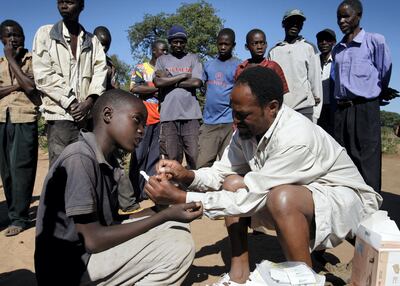The only approved vaccine against malaria should be widely used on African children, the World Health Organisation said on Wednesday.
The recommendation is potentially a major advance against a disease that kills hundreds of thousands of people annually.
“This is a historic moment. The long-awaited malaria vaccine for children is a breakthrough for science, child health and malaria control,” said WHO director general Dr Tedros Adhanom Ghebreyesus.
“Using this vaccine on top of existing tools to prevent malaria could save tens of thousands of young lives each year.”
Malaria is a primary cause of childhood illness and death in Sub-Saharan Africa. More than 260,000 African children under the age of five die from malaria every year.
In recent years, WHO and its partners have been reporting a stagnation in progress against the deadly disease.
WHO is recommending the widespread use of the RTS,S/AS01 (RTS,S) malaria vaccine among children in Sub-Saharan Africa and in other regions with moderate to high P. falciparum malaria transmission.
It follows a pilot programme in Ghana, Kenya and Malawi that has reached more than 800,000 children since 2019.
But the vaccine, known as Mosquirix and developed by GlaxoSmithKline (GSK), does have weaknesses. It is only about 30 per cent effective, requires up to four doses, and protection fades after months.

“For centuries, malaria has stalked Sub-Saharan Africa, causing immense personal suffering,” said Dr Matshidiso Moeti, WHO's regional director for Africa.
“We have long hoped for an effective malaria vaccine and now for the first time ever we have such a vaccine recommended for widespread use.
“Today’s recommendation offers a glimmer of hope for the continent which shoulders the heaviest burden of the disease and we expect many more African children to be protected from malaria and grow into healthy adults.”
In the US, the President’s Malaria Initiative set up by Joe Biden released a new five-year strategy, “End Malaria Faster”.
It has the goal of ending malaria within a generation, with the new plan focusing on reaching the unreached, strengthening community health systems and keeping malaria services resilient.
Life-saving medicine
GSK said that when the vaccine is given in combination with seasonal administration of antimalarial drugs, it "lowers clinical episodes of malaria, hospital admissions with severe malaria, and deaths by around 70 per cent".
Thomas Breuer, chief global health officer at the pharmaceutical giant, said "the long-awaited landmark decision" could reinvigorate the fight against malaria in the region at a time when progress on malaria control had stalled.
"Both real-world evidence and clinical trial data show that RTS,S, alongside other malaria prevention measures, has the potential to save hundreds of thousands of lives."
Gavi said it will work with other partners on how to finance the new malaria vaccination programme.
Dr Tedros praised the new drug and its potential.
"This vaccine can be delivered through child health clinics, by ministries of health and readily reach children at high coverage levels. Community demand for the vaccine is strong," he said.
"It has broad reach to children, including the most vulnerable who may not use a bed net, thereby expanding access to preventive measures to children at risk. It is safe. It significantly reduces life-threatening severe malaria and we estimate it to be highly cost-effective.”

